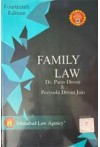- Author(s): Paras Diwan, Peeyushi Diwan
- Publisher: Allahabad Law Agency
- Edition: 14 Ed 2025
- ISBN 13 9789348002976
- Approx. Pages 620 + contents
- Format Paperback
- Approx. Product Size 24 x 16 cms
- Delivery Time 3-5 working days (within Kerala & South India) (Others 7-9 days)
- Shipping Charge Extra (see Shopping Cart)
............................................................................................................................
Description
It is always a great pleasure to bring out a new edition. Law is a dynamic concept and keeps changing. Mostly it changes bringing about reforms, more equality, more peace in the society, Matrimonial laws have been reformed over a period of time. But still most of them need a breath of fresh air. In our submission, fault grounds have become quite archaic. They still reek of an aspect of right and wrong, 'punishing the 'wrong doing spouse'. Anyone undergoing the pain of this adversarial litigation would narrate their tales of woe. There is its protracted, most unpleasant charges hurled at each other. Intimate details shared by two people living in matrimony are made public! Worst of all, this litigation refuses to come to an end! There is one more aspect of this type of litigation-is sanctity marriage governed by courts? Suppose one party had alleged desertion or cruelty or adultery or any other fault ground and is not able to prove the same and divorce is not granted. Is it possible for two parties, one who hates the other so much as to allege such charges and the other against whom such charges are leveled be expected to live with each other with love, peace and harmony! Are we serving the purpose of society? In our submission there should be just two grounds for divorce-mutual consent and irretrievable breakdown of marriage. In the latter a period of separation of 2 or 3 years should be fixed and the finances and economics of parties should be taken into account so that none of the parties end up holding the shorter stick. Our courts are awarding divorces on long protracted bitter battles of divorces on ground of cruelty. But then precious years are lost in litigation. To illustrate, a few cases have been given in the footnote.² Scrapping fault grounds would ease burden on our judicial system too. There should be a strong conciliatory machinery thrashing out cases and giving an opinion on settlement and such settlements should be presented before courts to adjudicate upon.
.........................................................................................................................
Contents
Part I - Preliminary
Chapter 1 Hindus, Muslims, Christians, Parsis and Jews
Chapter 2 Schools of Law, Migration, Domicile, Residence and Problem of Conflict of Personal Laws
Part II - Marriage
Chapter 3 Concept of Marriage and Theories of Divorce
Chapter 4 Marriages under Hindu Law, Muslim Law, Christian Law and Parsi Law
Part III - Dowry, Dower, Consortium, Cohabitation and Matrimonial Home
Chapter 5 Dowry and Dower
Chapter 6 Consortium, Cohabitation and Matrimonial Home
Part IV - Matrimonial Causes
Chapter 7 Nullity of Marriage
Chapter 8 Separation Agreement and Judicial Separation
Chapter 9 Restitution of Conjugal Rights and Remedy for Breach of Duty to Cohabit
Part V - Matrimonial Causes : Divorce
Chapter 10 Divorce without the Intervention of the Courts
Chapter 11 Fault Grounds of Divorce
Chapter 12 Divorce by Mutual Consent
Chapter 13 Irretrievable Breakdown of Marriage
Part VI - Matrimonial Cause (contd...)
Chapter 14 Fair-Trial-To-Marriage Rule and Bar to Remarriage
Chapter 15 Bars to Matrimonial Relief
Chapter 16 Reconciliation
Part VII - Ancillary Reliefs
Chapter 17 Alimony and maintenance
Chapter 18 Custody, Maintenance, Education of, and Access to, Children
Chapter 19 Property Adjustment and Financial Provisions
Part VIII - Matrimonial Cause (Contd...)
Chapter 20 Jurisdiction and Procedure
Chapter 21 The Family Courts
Part IX - Guardianship and Custody
Chapter 22 Guardianship and Custody, under Hindu Law
Chapter 23 Guardianship and Custody under Muslim La
Part X - Parentage and Adoption
Chapter 24 Parentage, Illegitimate and Legitimate Children and acknowledgement of Paternity under
Muslim Law
Chapter 25 Adoption under Hindu Law
Chapter 26 Adoption under Secular Law
Part XI - Maintenance
Chapter 27 Maintenance under Muslim Law
Chapter 28 Maintenance under Hindu Law
Chapter 29 Maintenance under Muslim Women (Protection of Rights of Divorce) Act, 1986
Chapter 30 Maintenance under the Criminal Procedure Code
Part XII - Hindu Joint Family System
Chapter 31 Mitakshara Joint Family
Chapter 32 Dayabhaga Joint Family
Chapter 33 Alienations
Chapter 34 Son's Pious Obligation to pay Father's Untainted Debts and Doctrine of Antecedent Debts
Chapter 35 Partition
Chapter 36 Woman's Property : Stridhan
Part XIII - Succession
Chapter 37 Succession under Hindu Law
Chapter 38 Succession under Marumakkattayam and Aliyasantana Laws
Chapter 39 Succession under Muslim Law
Chapter 40 Administration of Estates
Chapter 41 Wills under Muslim Law
Part - XIV - Gifts
Chapter 42 Gifts under Hindu Law
Chapter 43 HIBA (Gifts)
Part XV - Endowments and Wakfs
Chapter 44 Hindu Endowments
Chapter 45 Muslim Wakfs
.........................................................................................................................
Author Details
Dr. Paras Diwan, LL.M., Ph.D., Advocate Formerly Professor of Laws and Chairman, Department of Laws, Punjab University
Peeyushi Diwan, LL.M., Advocate Punjab & Haryana High Court, Chandigarh

